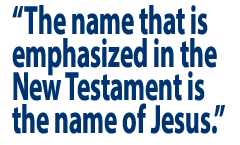The view that God’s exercise of his foreknowledge is infinite and that he does foreordain the course and destiny of all individuals is known as predestinarianism. Its advocates reason that God’s divinity and perfection require that he be omniscient (all-knowing), not only respecting the past and present, but also regarding the future. For him not to foreknow all matters in their every detail would evidence imperfection, according to this concept.
But consider the implications of such a predestinarian view. This concept would mean that, prior to creating angels or earthling man, God exercised his powers of foreknowledge and foresaw and foreknew all that would result from such creation, including the rebellion of one of his spirit sons, the subsequent rebellion of the first human pair in Eden (Gen. 3:1-6; John 8:44), and all the bad consequences of such rebellion down to and beyond this present day. This would necessarily mean that all the wickedness that history has recorded (the crime and immorality, oppression and resultant suffering, lying and, hypocrisy, false worship and idolatry) once existed, before creation’s beginning, only in the mind of God, in the form of his foreknowledge of the future.
If the Creator of mankind had indeed exercised his power to foreknow all that history has seen since man’s creation, then the full force of all the wickedness thereafter resulting was deliberately set in motion by God when he spoke the words: “Let us make man.” (Gen. 1:26) These facts bring into question the reasonableness and consistency of the predestinarian concept; particularly so since the disciple James shows that disorder and other vile things do not originate from God’s heavenly presence but are “earthly, animal, demonic” in source.-Jas. 3:14-18.
The argument that God’s not foreknowing all future events and circumstances in full detail would evidence imperfection on his part is, in reality, an arbitrary view of perfection. Ultimately, God’s own will and good pleasure are the deciding factors as to whether anything is perfect, not human opinions or concepts.-2 Sam. 22:31; Isa. 46:10.
To illustrate this, God’s almightiness is undeniably perfect and is infinite in capacity. (1 Chron. 29:11, 12; Job 36:22; 37:23) Yet his perfection in strength does not require him to use his power to the full extent of his omnipotence in any or in all cases. Clearly he has not done so, or, not merely would certain ancient cities and some nations have been destroyed, but the earth and all in it would have been obliterated long ago by God’s executions of judgment, as at the Flood and on other occasions. (Gen. 6:5-8; 19:23-25, 29) God’s exercise of his might is therefore not simply an unleashing of limitless power but is constantly governed by his purpose and tempered by his mercy, where merited.-Neh. 9:31; Ps. 78:38, 39.
Similarly, if, in certain respects, God chooses to exercise his infinite ability of foreknowledge in a selective way and to the degree that pleases him, then assuredly no human or angel can rightly say: “What are you doing?” (Job 9:12; Isa. 45:9; Dan. 4:35) It is therefore not a question of ability, what God can foresee, foreknow and foreordain, for “with God all things are possible.” (Matt. 19:26) The question is what God sees fit to foresee, foreknow and foreordain, for “everything that he delighted to do he has done.”-Ps. 115:3. (Watchtower 8/1/1970 pp. 469-70; see also Insight on the Scriptures, Volume 1, pp. 851-860 [specifically 853-854])



